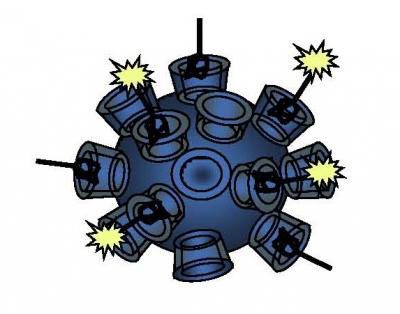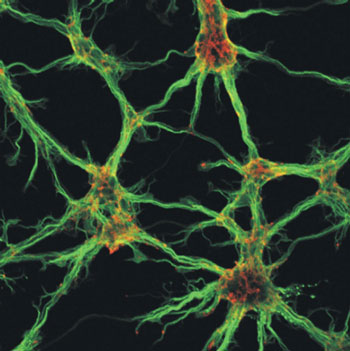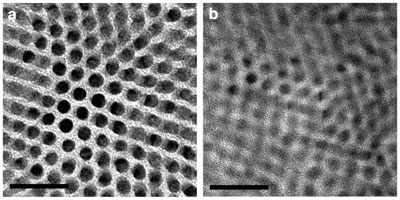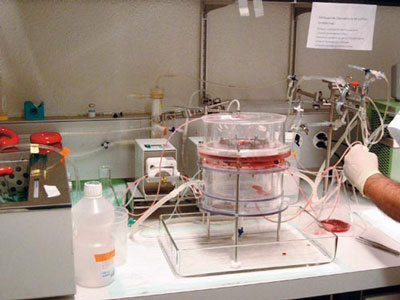 A California Institute of Technology-led team of researchers and clinicians has published the first proof that a targeted nanoparticle - used as an experimental therapeutic and injected directly into a patient's bloodstream - can traffic into tumors, deliver double-stranded small interfering RNAs (siRNAs), and turn off an important cancer gene using a mechanism known as RNA interference (RNAi).
A California Institute of Technology-led team of researchers and clinicians has published the first proof that a targeted nanoparticle - used as an experimental therapeutic and injected directly into a patient's bloodstream - can traffic into tumors, deliver double-stranded small interfering RNAs (siRNAs), and turn off an important cancer gene using a mechanism known as RNA interference (RNAi).
Mar 21st, 2010
Read more
The International Space Elevator Consortium (ISEC), an independent group designed to promote standards and foster research relating to the construction of an Elevator to Space, has announced its first annual set of prizes, named after the co-inventors of the modern-day concept of the Space Elevator, Jerome Pearson and Yuri Artsutanov.
Mar 21st, 2010
Read more
Electron Beam Lithography is a technique used for the patterning of optical masks for semiconductor integrated electronic circuits as well as for writing high-resolution patterns on substrates. This training session will provide an introduction to Electron Beam Nanolithography.
Mar 21st, 2010
Read more
The intersection of nanotechnology with the field of life sciences - including its growing impact on health care through improved diagnosis, treatment and prevention of disease - was the theme of a national conference held at the University of Albany's College of Nanoscale Science and Engineering on March 19.
Mar 21st, 2010
Read more
 Researchers in London have found that nanometer size diamonds can be attached to a wide range of substrates and that they can promote the growth of neurons without the need for the complex layers of proteins normally required.
Researchers in London have found that nanometer size diamonds can be attached to a wide range of substrates and that they can promote the growth of neurons without the need for the complex layers of proteins normally required.
Mar 20th, 2010
Read more
Using a system of nanofluidic channels and multicolor fluorescence microscopy, a team of investigators at Cornell University has developed a method that analyzes the binding of DNA and DNA-binding proteins known as histones at specific locations along individual DNA molecules.
Mar 20th, 2010
Read more
Using nanoparticles designed to recognize specific sugar-binding molecules on the surfaces of cells, a team of investigators at Michigan State University has developed a process that uses magnetic resonance imaging (MRI) to unlock the sugar-based code that identifies different types of cancer and normal cells.
Mar 20th, 2010
Read more
Forschungsverbund 'PhoNa' der Uni Jena nimmt mit einem Workshop am 24. und 25. 3. seine Arbeit auf.
Mar 20th, 2010
Read more
If one nanoparticle is good, two may be better, especially when they are designed to cooperate with each other to diagnose and treat cancer.
Mar 20th, 2010
Read more
To eliminate the need for invasive biopsy, and to improve upon the diagnostic sensitivity of biopsy, researchers have been working to develop non-invasive imaging techniques to identify tumor-bearing sentinel lymph nodes.
Mar 20th, 2010
Read more
5.000 Fachleute treffen sich zur Tagung der Deutschen Physikalischen Gesellschaft in Regensburg.
Mar 20th, 2010
Read more
Scientists have developed a dual-purpose nanoparticle that only enters cells coated with two proteins that tumor cells use to invade healthy tissue. Once the nanoparticles accumulate in tumor cells, they become readily visible using either MRI or a standard fluorescence microscope.
Mar 20th, 2010
Read more
 Researchers have shown how nanocomposites with desired properties can be designed and fabricated by first assembling nanocrystals and nanorods coated with short organic molecules, called ligands.
Researchers have shown how nanocomposites with desired properties can be designed and fabricated by first assembling nanocrystals and nanorods coated with short organic molecules, called ligands.
Mar 19th, 2010
Read more
 Interest in 'green' innovation means not just thinking big but also very, very, very small. At least that's the way Omowunmi Sadik, director of Binghamton University's Center for Advanced Sensors and Environmental Systems, sees it. She is working to develop sensors that would detect and identify engineered nanoparticles.
Interest in 'green' innovation means not just thinking big but also very, very, very small. At least that's the way Omowunmi Sadik, director of Binghamton University's Center for Advanced Sensors and Environmental Systems, sees it. She is working to develop sensors that would detect and identify engineered nanoparticles.
Mar 19th, 2010
Read more
 There is little information, for instance, on whether pregnant women exposed to these minute particles pass them on to their unborn babies. Scientists from Empa and the University Hospital Zurich now show first results.
There is little information, for instance, on whether pregnant women exposed to these minute particles pass them on to their unborn babies. Scientists from Empa and the University Hospital Zurich now show first results.
Mar 19th, 2010
Read more
SNNI's 5th annual conference, GN10: Reducing principles to practice on June 16-18, 2010 in Portland, Oregon, will feature the latest developments in the design and production of greener nanomaterials, discuss and debate how to move the technology forward while developing environmentally sound products and processes, and focus on a few critical developments that will determine whether the U.S. will be a leader or a follower in this critical field.
Mar 19th, 2010
Read more
 A California Institute of Technology-led team of researchers and clinicians has published the first proof that a targeted nanoparticle - used as an experimental therapeutic and injected directly into a patient's bloodstream - can traffic into tumors, deliver double-stranded small interfering RNAs (siRNAs), and turn off an important cancer gene using a mechanism known as RNA interference (RNAi).
A California Institute of Technology-led team of researchers and clinicians has published the first proof that a targeted nanoparticle - used as an experimental therapeutic and injected directly into a patient's bloodstream - can traffic into tumors, deliver double-stranded small interfering RNAs (siRNAs), and turn off an important cancer gene using a mechanism known as RNA interference (RNAi).




 Subscribe to our Nanotechnology News feed
Subscribe to our Nanotechnology News feed